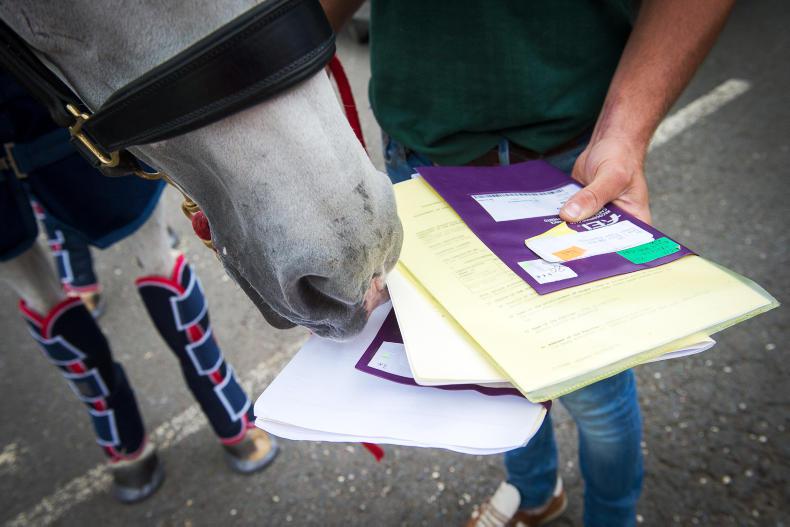VETERINARY surgeons in Ireland currently face grave difficulties in trying to balance their responsibilities to best treat horses in emergency cases in the absence of passports and playing their role in the protection of the food chain.
Many veterinary surgeons are called out to treat horses and ponies in emergency situations, where their owners do not have the passports to hand.
This puts vets in a very difficult situation, trying to balance the welfare and most appropriate treatment of the animal at hand and at the same time, ensure the protection of the human food chain.
It’s emerged that vets are now working on a unique microchip, separate from the identity microchip, which inserted into such equines would automatically show them up as being stamped out of the food chain system for life on the database.
The owners of any animals receiving medications like bute are, of course, supposed to have the passport to hand to be stamped by any treating veterinary surgeon. However, in many cases, passports are not produced, leaving vets in a real dilemma as to how best to treat the equines in front of them.
Members of the Equine Committee of Veterinary Ireland expressed their frustration over the existing situation to The Irish Field, feeling they are the ones who will be left to shoulder the responsibility over any breaches of the food chain in such situations.
The Equine Committee of Veterinary Ireland called on the Department of Agriculture, Food and the Marine to “educate horse owners and horse keepers on their responsibilities regarding medicines and record-keeping. Owners must ensure that any animal going into the food chain must be free of residues. All the veterinary practitioner can do is provide advice and guidance to his or her client within the current legislation and make sure their own records are complete.”
It’s emerged that Veterinary Ireland is having ongoing discussions with the registration bodies, including Wetherbys, where the default position for newly registered foals would be as non-food producers (ie automatically stamped out of the food chain), unless owners specifically state they intend keeping equines for food consumption purposes. Any owner wanting this option must strictly comply with all regulations that any other food producer must do for the entirety of the horse’s life.
Hugh Dillon of Troytown GreyAbbey Equine Veterinary Services, Co Kildare, told The Irish Field that any horse or pony which had a career, at any level, should be stamped out of the food chain for life, including racehorses, sport horses, riding school horses, leisure horses and hunters.
“Any horse that has any type of athletic career, at any level, has received at least a sachet of bute in its lifetime, in my experience. Bute has been show to cause Aplastic Anemia (can cause leukaemia) in people but while it is rare, it is not dose dependent. Food safety is paramount in the EU. We pride ourselves in Ireland on the farm to fork protection system. Horse owners cannot have their cake and eat it.
“In many cases, vets are called out to treat horses in emergency situations. The passports are not there, and technically, it is illegal for vets to give the meds without the passport. As vets, we are being compromised all of the time.
“I believe that at the time of registration, the animal should be automatically stamped out unless an owner states he wants it stamped into the food chain. People in Ireland should not be precluded from raising horses for the food chain, like what happens in Europe. But they must understand that if they choose to do that, it carries a huge amount of responsibility. Those equines kept for the food chain must be treated the very same as a farmer who raises beef calves for example. He/she has a huge amount of paperwork to keep up with, keeping very strict records, every single wormer for example is recorded,” explained Dillon.
DAMAGE
“We have a large population of lower value horses in Ireland and it is quite hard to keep track of them. In some sectors, it is still a challenge to microchip them for identity. That cohort has the biggest abandonment issues.
“Vets have to ensure horses are treated properly and humanely, that’s the number one. We also have to ensure protection of the food chain as food production is so important to Ireland and the horse side of that is miniscule in comparison to the livestock side. If there is another meat scandal like we had a few years ago, it would do a lot of damage,” continued Dillon, who also said that FEEVA (The Federation of European Equine Veterinarian Association) were bringing their arguments on food chain issues to Brussels.
Troytown horse vet Bridget McGing added that sport horses and racehorses should be stamped out at source, pointing out that the factory price of a few hundred euros per head was little more than the cost of short-term livery fees. Referring to the separate issue of neglected and abandoned horses, McGing pointed out that this really was about the proper enforcement of microchipping and the promotion of responsible ownership.
UNIQUE MICROCHIP
VETS are working on a unique microchip, separate from the identity microchip.
The idea behind it is that any vet treating a horse for meds without a passport, inserts this unique microchip into the animal at time of treatment.
This stamps that horse out of the food chain for life and is automatically recorded on the database.
